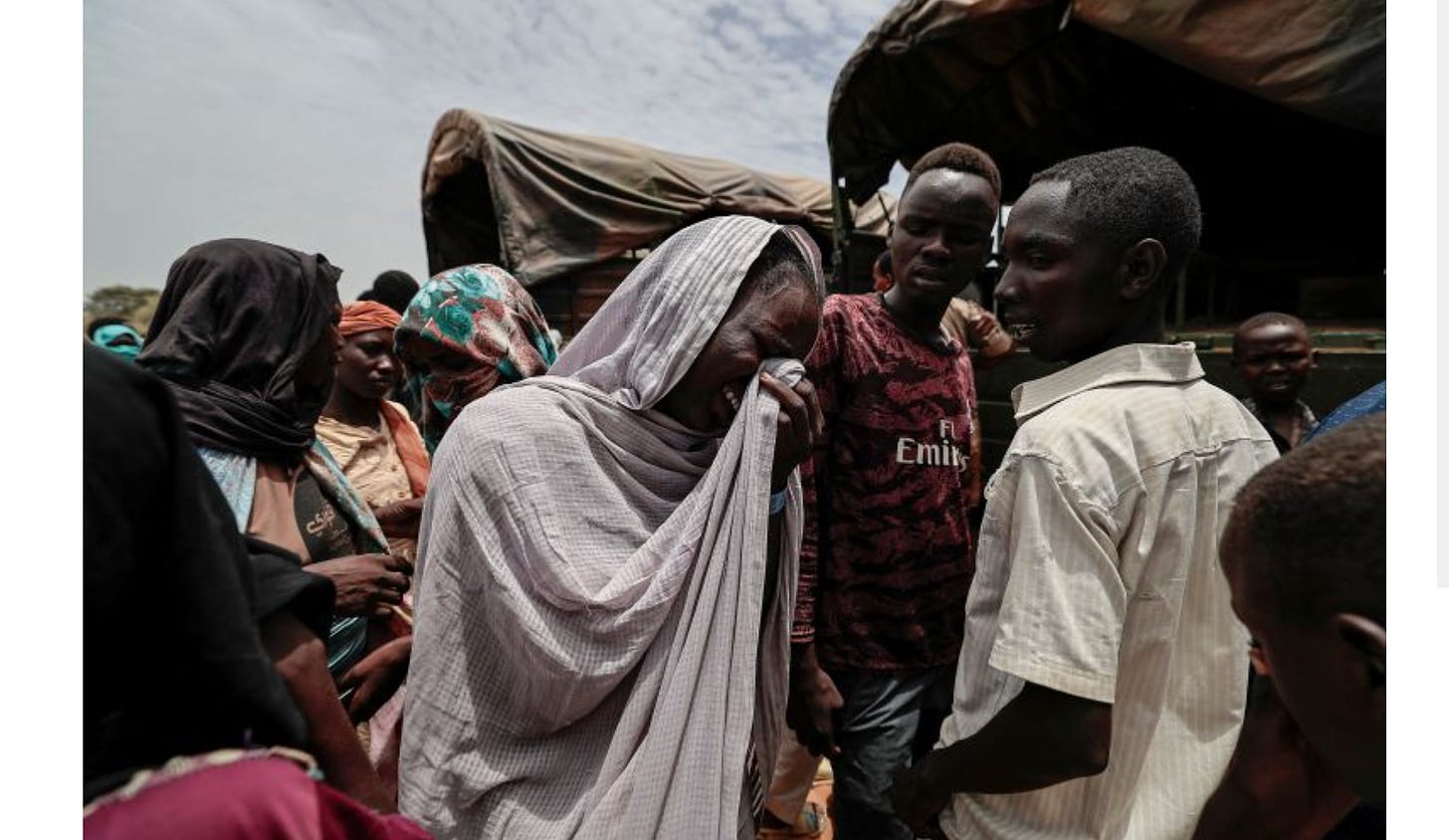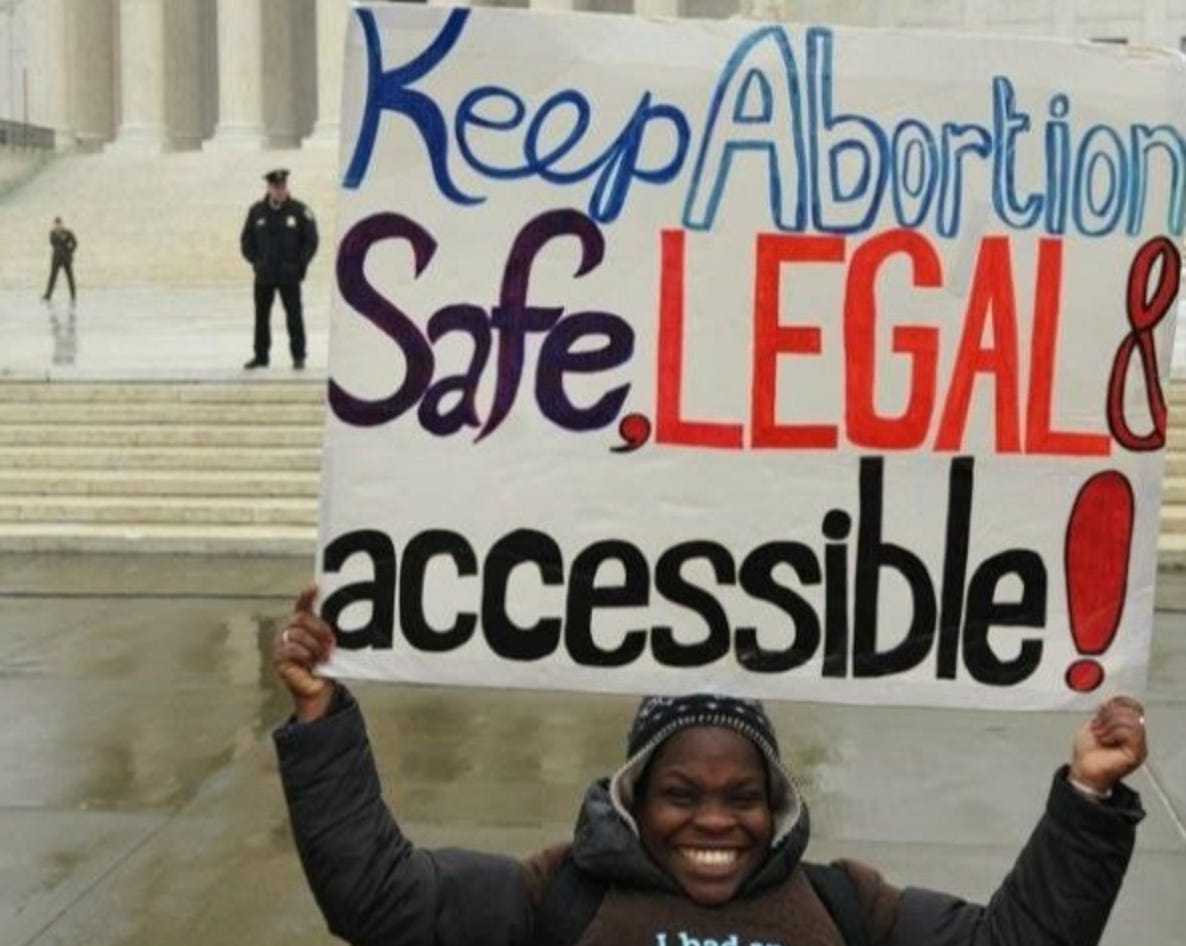Global Roundup: Sudanese Women, Delhi Queer Pride Parade, Italy GBV Case & Movie, Kenya Abortion Rights, Bhutan LGBTIQ+ Community
Curated by FG Contributor Samiha Hossain
A Sudanese woman, who fled the conflict in el-Geneina in Sudan's Darfur region, mourns her relatives who she says were killed by the RSF, in Ourang on the outskirts of Adre, Chad, on July 25, 2023 [File: Zohra Bensemra/Reuters]
CW: rape, sexual violence
Ellen Johnson Sirleaf, former president of Liberia, writes about how women are bearing the brunt of the vicious war in Sudan. Sudanese women are an inspiration to Sirleaf. She recalls that when the people of Sudan took to the streets to call for the ouster of President Omar Hassan al-Bashir in 2019, women were at the forefront, leading the movement for democracy and change. It was estimated that women made up as many as two-thirds of the protesters.
Now, Sudanese women are bearing the brunt of the war that began in mid-April between the Sudanese Armed Forces (SAF) and the paramilitary Rapid Support Forces (RSF). More than six million people have been displaced, including an estimated 105,000 women who are currently pregnant, according to the United Nations. Of the 1.2 million who have fled to neighbouring countries, nearly nine in 10 are women and children. Furthermore, more than four million women and girls are at risk of sexual violence in Sudan, according to the World Health Organization.
While a UN experts’ report accused both parties of violations of humanitarian and human rights law, the experts expressed alarm at the brutal and widespread use of rape and other forms of sexual violence by the RSF. Some of the reported rapes appeared to be ethnically and racially motivated, the experts said, in a frightful echo of the Darfur crisis of 20 years ago. A new UN report describes how women and girls are being abducted and held in ”inhuman, degrading slave-like condition in areas controlled by the RSF in Darfur, where they are allegedly forcibly married and held for ransom.” Sources told the UN that women and girls have been seen in chains on pick-up trucks and cars.
Sirleaf also expresses deep concern at the reports that the United Arab Emirates has been supplying arms to the RSF. She says the UAE has a duty to renounce and sever any ties with the criminal forces of the RSF.
When I was given the privilege of serving as president of Liberia, I assumed responsibility for rebuilding a nation nearly destroyed by war and plunder. I saw first-hand how essential women’s empowerment was in moving a country towards reconciliation. So it must be in Sudan. Let us – all of us – contribute to that effort. -Ellen Johnson Sirleaf
Keep Abortion Safe, Legal & Accessible.jpg" by Debra Sweet is licensed under CC BY 2.0.
Legal ambiguity over abortions in Kenya is pushing thousands of women to turn to backstreet clinics. The penal code, which has its origins in the colonial era, outlaws abortion, criminalising the woman, the person who carries out the abortion and the person who supplies the material required. However, the 2010 constitution, combined with a wider body of law, does allow abortion when "the life or health of the mother is in danger" or when the pregnancy has resulted from rape or incest.
Few doctors providing legal abortions are willing to talk about the issue openly. High-profile arrests over the years have made the situation "dangerous for health workers", according to Prof Joachim Osur, a reproductive and sexual health expert at Amref International University in Nairobi. It is about how the law is understood.
The ones who come with the post-abortion complications, most of them are young people…. The women actually start [the procedure] themselves, or they do it with assistance of an untrained person. - Joachim Osur
According to the global human rights organisation, Center for Reproductive Rights, around seven women and girls die every day in Kenya because of unsafe abortions. Thousands more are hospitalised. Anti-abortion campaigners and associated religious organisations in Kenya, many of whom are supported by the anti-abortion lobby in the United States, insist the law is clear: abortion is illegal.
MP Esther Passaris not only speaks out in favour of abortion but is pushing for improved sexual health and family planning education too. Passaris says that while the 2010 constitution legalised abortion in certain circumstances, she argues that the fear around it restricts women's access to health services, particularly for those from poorer communities.
Our constitution allows abortion only when the wellbeing of the mother is in question, and the wellbeing is not just physical and biological, it's emotional and economical. I think it's about time that we understand the emotional burden of not having access to family planning, not empowering the woman so that she knows that she doesn't have to become a baby-producing machine. -Esther Passaris
A participant of the Delhi Queer Pride Parade poses for a photograph during the march in New Delhi, India, Nov. 26, 2023.
Last weekend, more than 2,000 people danced, sang and cheered in a gay pride parade in India's capital, New Delhi. Dancing to drums and music, the participants walked for more than two hours to the Jantar Mantar area near India's Parliament. They held banners reading "Equality for all" and "Queer and proud."
The annual event comes after India's top court refused to legalize same-sex marriages in an October ruling that disappointed campaigners for LGBTQ+ rights in the world's most populous country.
It's not about marriage. It's about equality. Everybody should have the same right because that's what our constitution says. -Noor Enayat, event volunteer
Earlier this year, the Supreme Court's five-judge bench heard 21 petitions that sought to legalize same-sex marriage in India. The justices called for steps to raise awareness among the public about LGBTQ+ identity and to establish hotlines and safe houses for those in the community who are facing violence. They also urged the state to make sure same-sex couples don't face harassment or discrimination in accessing basic needs, like opening a joint bank account, but stopped short of granting legal recognition to same-sex unions.
Legal rights for LGBTQ+ people in India have been expanding over the past decade, mostly as a result of the Supreme Court's intervention. In 2018, the top court struck down a colonial-era law that had made gay sex punishable by up to 10 years in prison and expanded constitutional rights for the gay community. The decision was seen as a historic victory for LGBTQ+ rights. Despite this progress, Prime Minister Narendra Modi's Hindu nationalist government resisted the legal recognition of same-sex marriage and rejected several petitions in favor. Some religious groups, too, had opposed same-sex unions, saying they went against Indian culture.
Director Paola Cortellesi’s drama “C’e’ Ancora Domani” (“There’s Still Tomorrow”) - which addresses the questions of gender violence and women’s rights - is taking Italy by storm. (Nov. 23)
CW: gender-based violence, femicide
Just days before the killing of 22-year-old Giulia Cecchettin, Italians were already applauding a blockbuster movie about a woman who endures beatings and belittling by her overbearing husband. The movie is set in 1946, 24 years before divorce became legal in Italy and on the eve of the first time Italian women were allowed to vote. The film’s exploration of the suffocating role of patriarchy in Italian society is painfully resonating today.
Giulia Cecchettin disappeared after meeting her former boyfriend, Filippo Turetta, for a burger at a shopping mall, just days before she was to receive her degree in biomedical engineering at the University of Padua. Her ex-beau, a year younger, friends and family said, resented that she had finished her studies ahead of him and feared she’d move on to pursue personal and professional dreams.
Giulia’s case shook all of Italy. Because in her disappearance, all of Italy knew that shortly there would have been the discovery of a young woman slain at the hands of a man. Because by now it’s the same routine. It’s chilling to call it a routine. -Paola Cortellesi, actress and director
As the real-life drama of Cecchettin’s killing played out, the movie “C’è ancora domani” (There’s still tomorrow) riveted audiences across Italy. Cortellesi, who directed the movie, said her work swept up audiences “beyond the ordinary, precisely because, as I have been saying, it hit a raw nerve in the lives of everybody.” A noted Italian comic actress, Cortellesi also plays the lead role of Delia, an abused Roman wife hoping for a better future for her teenage daughter. Cortellesi recounted how, at one screening, a woman stood up and revealed to a theater full of strangers that she, too, had an abusive husband, saying “I was Delia.”
Unfortunately, the theme of violence against women is always actual. Instead, no, we have to yell, we have to communicate the beauty of being women. -Daria Dicorpo, middle-school teacher in Rome
Last week, after final passage of a bill to protect women with such measures as increased use of electronic monitoring devices for men stalking or threatening them, lawmakers from the opposition 5-Star Movement pounded rhythmically on their desks “in a minute of noise.” Director Cortellesi appealed to the two most powerful women in Italian politics today — far-right Premier Giorgia Meloni and Elly Schlein, who heads the Democratic Party, Parliament’s largest force on the left. She asked them to “do something (about women’s violence) that doesn’t have anything to do with keeping their electorate happy,” she said.
Members of Queer Voices of Bhutan. Photo: Pema Dorji/QVoB
In June 2022, in the middle of Pride Month celebrations across the world, Tashi Choden Chombal was crowned the third Miss Bhutan. Chombal was 23 years old at the time and had been openly gay for nine years. She came out on social media as bisexual when she turned 15 and was pleasantly surprised by responses of acceptance and support. This was the moment when she decided to research sexual identities and orientations. Before the pageant, she was a model and an aspiring actor, but after her win she became one of the most recognisable people in the country, and especially prominent as a queer activist.
This opportunity allowed me to shine on the global stage and advocate for my rights as an individual, representing both the beautiful country of Bhutan and my community. -Tashi Choden Chombal
Chombal’s win and imminent participation in the global Miss Universe pageant felt significant to the LGBTIQ+ community in Bhutan especially because it came on the heels of the decriminalisation of homosexuality by law. In December 2020, the country’s parliament voted to change two sections of the Penal Code that criminalised “unnatural sex”, which until that time was widely understood to refer to gay sex. The change in the law received royal assent in February 2021. The community now hopes to capitalise on the momentum of the last few years to campaign for marriage equality, legal gender recognition and other crucial protections.
Many queer people say they do not feel unsafe in Bhutan yet often face social pressures, ranging from being rendered invisible to being bullied and ostracised. Pema Dorji, a queer advocate, said that many queer students in schools have faced sexual assault and that these cases often go unreported due to fear and stigma. Dorji is the founder of Queer Voices of Bhutan (QVoB), a platform for queer advocacy that he started in 2018 to share the stories and experiences of queer people and to organise events to keep the queer community visible.
Currently, discussion around queer communities has little or no penetration into the mainstream conversation. The conversation should also be around the policymakers to have specific laws that legalise and protect LGBTIQ [individuals] as tax-paying citizens [with] rights to everything, and irrespective of our gender we can have rights to pension, employment and recruitment as a queer person. -Pema Dorji
Many queer people were hoping that hearings on marriage equality in India’s Supreme Court earlier this year would bring a positive outcome that would also nudge Bhutan in the right direction. Unfortunately, the Indian court did not rule in favour of recognising same-sex marriage, saying that it was up to the country’s parliament to legislate on the issue.
Samiha Hossain (she/her) is an aspiring urban planner studying at Toronto Metropolitan University. Throughout the years, she has worked in nonprofits with survivors of sexual violence and youth. Samiha firmly believes in the power of connecting with people and listening to their stories to create solidarity and heal as a community. She loves learning about the diverse forms of feminist resistance around the world.







